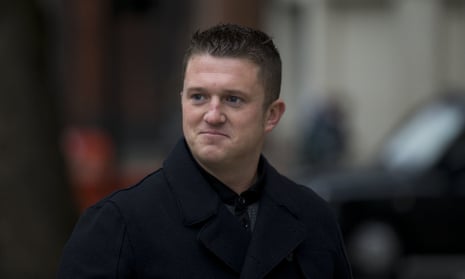Leading far-right activists have received special protection from Facebook, preventing their pages from being deleted even after a pattern of behaviour that would typically result in moderator action being taken.
The process, called “shielded review”, was uncovered by Channel 4 Dispatches, after the documentary series sent an undercover reporter to work as a content moderator in a Dublin-based Facebook contractor, Cpl.
Typically, Facebook pages are deleted if they are found to have five or more pieces of content that violate the site’s rules. But more popular pages, including those of activists like Tommy Robinson, are protected from those rules and are instead elevated to a second tier of moderation where in-house Facebook staff, rather than external contractors, take the decision on whether or not to take action.
Most of the pages granted shielded review are for governments and news organisations, but Robinson – whose real name is Stephen Yaxley-Lennon – and the defunct political party Britain First were given the same status. In effect, although individual pieces of content are still removed by Facebook, the normal rules do not apply to the page itself for all but the most egregious breaches of the site’s guidelines.
In the documentary, a moderator tells the Dispatches reporter that Britain First’s pages were left up, even though they repeatedly broke Facebook’s rules, because “they have a lot of followers so they’re generating a lot of revenue for Facebook”.
Britain First’s Facebook page was eventually banned in March 2018, almost six months after it was deregistered as a political party and a week after its leaders were jailed for a series of hate crimes against Muslims. Robinson is also in jail, serving a 13-month sentence for contempt of court.
In the Dispatches documentary, Facebook’s head of public policy, the Liberal Democrat peer Richard Allan, disputes that the rules are based on revenue. “If the content is indeed violating it will go,” Allan said.
“I want to be clear this is not a discussion about money. This is a discussion about political speech. People are debating very sensitive issues on Facebook, including issues like immigration. And that political debate can be entirely legitimate. I do think having extra reviewers on that when the debate is taking place absolutely makes sense and I think people would expect us to be careful and cautious before we take down their political speech.”
On Monday, Allan addressed Robinson’s page directly, and told the Guardian: “We remove content from Facebook no matter who posts it, when it breaks our standards. If Tommy Robinson’s page repeatedly violated our community standards, we would remove it, as we did with Britain First.”
The Dispatches programme also alleged that Facebook moderators were trained to ignore visual evidence that a user was below the age of 13, and so should not be on the site, even if they were being investigated for breaking rules such as those governing self-harm.
“We have to have an admission that the person is underage,” a trainer told the undercover reporter. “If not, we just, like, pretend that we are blind and we don’t know what underage looks like.” When pushed on whether it even applies in areas such as self-harm, the trainer gave confirmation, saying: “If this person was a kid, like a 10-year-old kid, we don’t care, we still action the ticket as if they were an adult.”
The choice to ignore evidence suggesting a user is underage could pose problems for Facebook, which is required in the US and EU to prevent children under 13 from using their site. Speaking to the US Senate earlier this year, Mark Zuckerberg told senators that “we don’t allow people under the age of 13 to use Facebook”, but did not disclose the fact that Facebook trains its moderators to not act on visual evidence to the contrary.
Allan told the Guardian that Facebook investigates underage users who have been reported to its moderators as underage. “If a Facebook user is reported to us as being under 13, a reviewer will look at the content on their profile (text and photos) to try to ascertain their age,” he said. “If they believe the person is under 13, the account will be put on a hold. This means they cannot use Facebook until they provide proof of their age. We are investigating why any reviewers or trainers at Cpl would have suggested otherwise.”
Over the past two years, Facebook has gradually opened up to the outside world about how it runs its moderation efforts. In 2017, the Guardian obtained and published the company’s internal guidelines, revealing for the first time Facebook’s policies around sex, terrorism and violence.
A year later, Facebook published its own versions of the guidelines, offering the first detailed look at its rulebook in more than a decade of operation.
Responding to questions about the story, Allan said: “It’s clear that some of what is shown in the programme does not reflect Facebook’s policies or values, and falls short of the high standards we expect. We take these mistakes in some of our training processes and enforcement incredibly seriously and are grateful to the journalists who brought them to our attention.
“Where we know we have made mistakes, we have taken action immediately. We are providing additional training and are working to understand exactly what happened so we can rectify it.”
